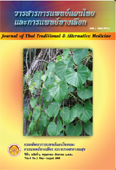Pain-relieving Effects of Hot Herbal Compress in Patients with Knee Osteoarthritis
Main Article Content
Abstract
The present study was a quasi-experimental research study, the purpose of which was to determine the pain-relieving effect of hot herbal compresses in knee osteoarthritis patients by comparing the severity of pain, duration between each pain episode and difficulty in performing daily activities between three treatment groups, namely, herbal compress, hot compress and isometric knee exercise. Subjects were osteoarthritis patients being treated as in-patients at Damnoensaduak Hospital for five days. A questionnaire was created to assess pain levels and the difficulty in performing daily activities before and after the treatment using the visual analog scale. The data obtained were analyzed using paired t-test and one-way analysis of covariance. It was found that the levels of knee pain and difficulty in performing daily activities in the three treatment groups were significantly lower than the levels before receiving the treatment (p < 0.01). The scores of knee pain, duration between each pain episode, and difficulty in performing daily activities were not significantly different among the three groups. However, the reduction of mean pain scores during the first two days of the hot herbal compress group was statistically significant (p < 0.01) and more rapid than the other two groups. It is suggested that the Institute of Thai Traditional Medicine apply the results of the present study in the clinical practice guideline for the treatment of knee osteoarthritis by using hot herbal compresses during the first two days of treatment. When the inflammation subsides, other methods of treatment, such as hot compress and isometric knee exercise, should then be used instead, as these two methods cost less but give
equivalent therapeutic efficacy.


